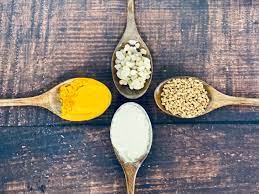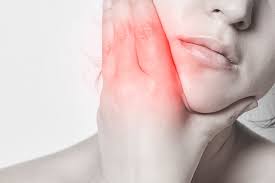Table of Contents

There are several Home and Natural remedies to relieve toothache that you can try:
- Salt water rinse: Rinse your mouth out several times a day with warm salt water. Saltwater can assist to destroy oral bacteria and minimize edema.
- Garlic: Press a crushed garlic clove to the afflicted tooth. Garlic contains natural painkilling and antimicrobial effects.
- Clove oil: Apply the oil directly to the afflicted tooth by soaking a cotton ball in it. Since ancient times, clove oil has been used to treat toothaches, and it frequently appears in over-the-counter toothache medications.
- Cold compress: Apply a cold compress on the outside of your cheek, close to the hurt tooth. This may assist in numbing the area and bringing down swelling.
5. Peppermint tea bags: Place a wet tea bag over the troubled tooth. While the menthol in peppermint has a numbing effect, the tea bag’s cooling can aid in pain relief.
6. Hydrogen peroxide rinse: Rinse your mouth with 3% hydrogen peroxide and equal parts water as a hydrogen peroxide rinse. This can reduce discomfort and assist to destroy bacteria.
7. Guava leaves: Chew on them or apply them to the tooth that is hurt. Guava leaves have anti-inflammatory and pain-relieving properties that can aid tooth pain.
8. Tea tree oil: Apply a few drops of tea tree oil to the afflicted tooth after combining it with carrier oil like coconut oil. Tea tree oil contains antibacterial qualities and can aid with pain relief and inflammation reduction.
9. Garlic: Chew on a slice of raw garlic or lay a slice of raw onion on the afflicted tooth. The antimicrobial qualities of onions also make them effective painkillers.
10. Asafoetida: To make a paste, combine a tiny amount of asafoetida powder with water. To the tooth that is harmed, apply the paste. Because of its capacity to reduce inflammation and relieve pain, asafoetida has been utilized in traditional medicine.
11. Wheatgrass juice: Use wheatgrass juice to rinse your mouth. Wheatgrass offers bacterial-fighting and analgesic qualities that can ease dental pain.
12. Aloe vera: Directly affect the tooth with aloe vera gel. Aloe vera possesses anti-inflammatory and pain-relieving qualities that can aid tooth pain.

13. Baking soda: To make a paste, combine baking soda with a tiny amount of water. To the tooth that is harmed, apply the paste. Baking soda has alkaline characteristics that can assist to neutralise the acid that causes tooth discomfort in addition to mild pain-relieving and anti-inflammatory effects.
14. Salt and warm water: Rinse your mouth out with a little bit of salt and warm water. Warm water can aid to ease discomfort while salt can help to reduce swelling and kill bacteria.
15. Oil pulling: A tablespoon of oil, such as coconut oil, is swished around in the mouth for a few minutes before being spat out. For decades, traditional medicine has employed oil pulling to reduce tooth pain and enhance dental health.
16. Vanilla extract: Apply the affected tooth with a cotton ball that has been dipped in vanilla extract. Natural remedies like vanilla extract have the ability to numb the area.
17. Ice: Apply an ice pack to your cheek’s exterior, close to the hurt tooth. The area may get numb and the swelling may go down due to the cool weather.
18. Licorice root: Chew on a piece of licorice root or place a piece of it on the tooth that is hurt. Natural painkilling and anti-inflammatory qualities can be found in licorice root.
19. Turmeric: To make a paste, combine water and turmeric powder. To the tooth that is harmed, apply the paste. Natural anti-inflammatory and painkilling effects exist in turmeric.
20. Ginger: Chew some fresh ginger or put some ginger on the tooth that is hurting. Ginger naturally reduces inflammation and relieves pain.
21. Thyme oil: Apply a few drops of the mixture to the afflicted tooth after combining it with carrier oil like coconut oil. Natural antibacterial and painkilling qualities can be found in thyme oil.
22. Echinacea: Chew on some fresh echinacea leaves or apply a piece to the hurt tooth. Natural painkilling and anti-inflammatory effects are provided by echinacea.
23. Salt and vinegar: To make a paste, combine salt and vinegar in equal amounts. To the tooth that is harmed, apply the paste. The salt can aid in reducing swelling, while the vinegar has natural antimicrobial characteristics.
24. Lemon juice: Use fresh lemon juice to rinse your mouth. Lemon juice naturally fights bacteria and soothes discomfort.
Frequently Asked Questions
Can a toothache heal itself?
While toothache occasionally goes away on its own, it usually calls for dental care. Treatment is required for toothache conditions such as bruxism, tooth decay, gum disease, and others. If tooth discomfort lasts for more than a few days, make an appointment with your dentist for an examination.
What are natural remedies or antibiotics for tooth infections?
Garlic’s ability to kill germs makes it a popular treatment for illnesses. They are regarded as organic antibiotics. Allicin, a substance found in this typical cooking ingredient, has been demonstrated in studies to be effective at killing bacteria. Infection-related tooth discomfort may also be relieved with fresh garlic.
How should I sleep with tooth pain?
Sleep with your head elevated. Raise your head with a couple of pillows to stop blood from rushing to your head and aggravating tooth discomfort. Use an ice pack – An ice pack or cold compress helps numb the region and lessen the irritation.
Why do teeth hurt at night?
The position in which we sleep is primarily to blame for toothaches being more painful at night. When we lie down, more blood rushes to our heads, increasing pressure on delicate places like our mouths. Due to most of the day being spent standing or sitting, we don’t experience that pounding sensation as much.
Why do all my teeth hurt suddenly?
The most common causes of a sudden toothache include fractured or infected teeth, as well as the onset of tooth sensitivity in conjunction with another issue. The majority of causes of unexpected tooth pain are simple for your dentist to handle, which is a good thing.
Remember that you should only use these treatments to relieve temporary discomfort because they are not a replacement for skilled dental care. If your toothache doesn’t go away, schedule an appointment with a dentist right away.